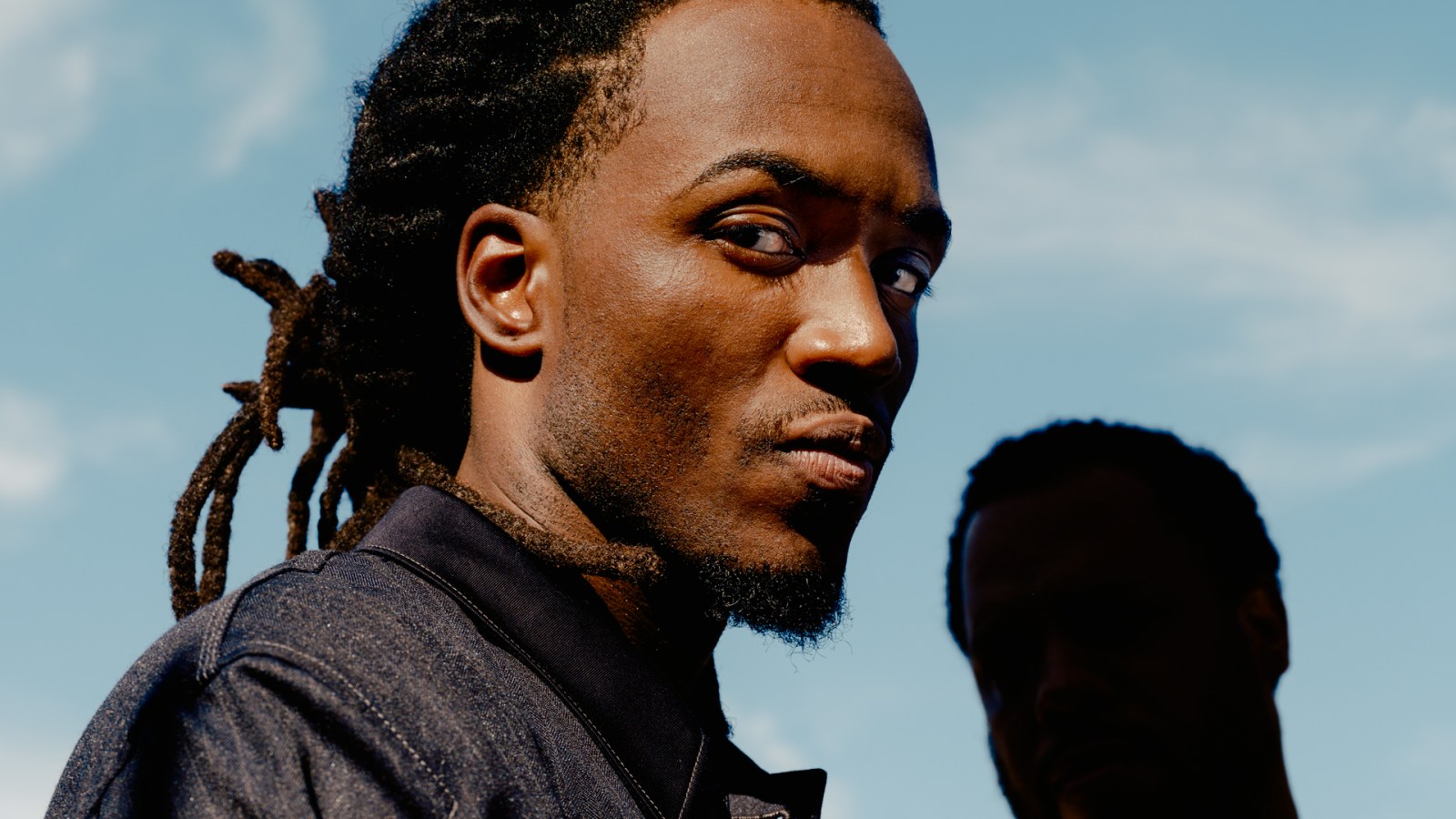D
espite being 23 years his senior, prolific producer No ID has a much more childlike air than Chicago indie rapper Saba, who is quietly pensive, if not a tad guarded. When we meet at No ID’s Los Angeles studio in October, the pair sit next to each other at a long desk. No ID, 53, swivels toward us when he’s amused, making animated faces and cracking mischievous smiles. And even as the person who molded a young Kanye West and oversaw the production of Jay-Z’s most introspective album, 2017’s 4:44, No ID still considers himself a perpetual student — he and Saba, 30, are even enrolled in a photography class together as he works on a coffee-table book. “I never like to disrespect a genre, so, education,” he says, toying with a Leica.
The photography class is a bit of a side quest. Right now, their main task is wrapping up a joint album, From the Private Collection of Saba and No ID, which they’ve been working on since 2022. Due out in January, it’s a refreshingly rich and cohesive testament to their individuality and the promise of hip-hop. With a deft mix of soulful samples and original loops, the album feels like a sliver of sunlight hitting you while you uncover treasures in your grandma’s attic. Saba’s raps are full of the sage self-excavation of someone who spends a lot of time in their own head. “I’m an introvert, but I’m popular,” he says knowingly on a song that seems to slickly reimagine Janet Jackson’s “I Get Lonely.”
While Saba may not have quite the name recognition of No ID’s past collaborators, like Jay-Z, Common, or Nas, the younger MC helped define the jazzy, cerebral sound of Chicago in the 2010s alongside peers like Noname and Chance the Rapper. Though he has built a dedicated fan base that packs out shows and streams him devotedly, Private Collection feels like a reintroduction, in which he’s as skilled at magnifying the minutiae of his life — like growing out his hair and taking up yoga — as he is at processing horrors like the killings of some of the people closest to him. Yet the album radiates optimism and personality, a bright mosaic of the pair’s layered lives.
Before working with No ID, Saba was influenced by a long line of mentors, like his dad, an R&B singer who performs as Chandlar, and his uncle, producer Tommy Skillfinger, who helmed the first version of the Private Collection song “Big Picture” just before he died last year. No ID knew both of them well on the scene in Chicago, which is also his own hometown. But he’s not eager to take on the title of mentor for himself — despite such artists as Kanye West, J. Cole, and Logic famously offering him that credit in their songs “Big Brother,” “Let Nas Down,” and “5 Hooks.” “I don’t think I’ve ever in my life said, ‘Hey, I’m going to mentor anyone,’ ” he says. “That’s marketing.” What he’s actually done, he says, is gotten to know people he’s seen something special in, and shared what he knows with them. “I just go, ‘Hey, man, hop on the truck. Let’s go ride. We’ll see some things, we’ll talk, we’ll take some photos.’ ”
Early in their relationship, No ID tried to sign Saba when he was an executive vice president at Capitol, but Saba — who’d seen success as an independent artist — was skeptical. “I would always be like, ‘Bro, just come on, man. It’s me!’ ” No ID recalls. “When I worked at labels, people viewed me totally different than who I am. It’s like, ‘I’m a warrior. I’m one of you. Why is this conversation going like this? I’m Harriet Tubman!’… And it’s like, ‘Nah, you’re with them.’ ”
For years, they stayed in touch, getting to know each other more organically. No ID came to understand Saba’s stoic nature, playfully nicknaming him Confucius, and Saba got to experience No ID’s taste for Michelin-star dining experiences. “Since working with him, he’s taken us to a few different tasting menus that have been real extravagant,” Saba says. “The food is some art shit.”
They’ve gone back to Chicago together and talked through their complicated relationship with their hometown. Chicago is the place where the murder of Saba’s cousin and collaborator, John Walt, sculpted his stunning 2018 album, Care for Me, and where he lost another close friend, DJ and producer Squeak, not long before he finished his last album, 2022’s Few Good Things.
Saba calls one of his first studio sessions with No ID, in 2019, “memorable as fuck.” “He made 20 beats in one sitting,” Saba says. “He just sat in the corner, made 20 beats, gave me 20 beats, and then went home.” No ID remembers wanting to feel out Saba’s approach in the studio: “I’m not proving much at this point. I’m just doing what I love. And I remember going, ‘I wonder how he’s going to take to this event.’ ” As they revisit this memory together, Saba strokes his chin reflectively. No ID points it out: “He’ll [make] that face right there and you’ll be like, ‘What’s he thinking?’ ”
So when Saba received a pack of more than 100 beats from No ID while he was on the road in 2022, it wasn’t exactly unprecedented. Still, Saba took it as another test: “He just trusted me with 100-plus beats. He gave me a shot. Let me just get something done.” Though Saba was already in the midst of major life changes — losing Squeak, leaving Chicago, and buying a home in Los Angeles — he managed to make 13 songs that reflected the transitory time.
No ID had made those beats in about a month as a way of testing himself. “There’s producers, and there’s beatmakers,” he says. When I ask him to differentiate the two, he points to Quincy Jones. “Quincy Jones did no music on Thriller and Off the Wall,” he says (speaking several weeks before the legendary artist’s death at age 91). “He just brought the team together. That was his role as a producer: make decisions. ‘No, this key. No, this writer. No, that drummer, that engineer.’ He didn’t go, ‘I’ve got this instrumental, Mike.’ That’s hip-hop.”
As No ID sees it, somewhere along the way, his own genre shamed the beatmakers and romanticized the “huge, larger-than-life people who sit in chairs and tell everybody what to do” instead. “I felt like, ‘Man, I became too much of a producer. I need to be a beatmaker again.’” So he challenged himself to build an arsenal of beats that would have been good enough for Biggie.
Saba handled them expertly. “I was like, ‘Oh, yeah, this is what I’m talking about,’ ” No ID says, recalling when he got the first songs back. He was down to put them out as a mixtape — but Saba thought they could go even harder. “I think it’s just looking at what I’m capable of and what he’s capable of and going, ‘This is a nice introduction. What are we making, though?’ ” Saba says.
When I ask the pair which songs they had the most fun with, No ID asks to go first. “Go ahead,” Saba concedes. “Thank you, Confucius,” No ID says, smirking. There’s one called “30secondchop.wav,” a thick-skinned cypher between Saba, his brother Joseph Chilliams, and his cousin Jean Deaux that came from a quick production trick No ID was teaching Saba one day. Then there’s “Crash,” a sweet serenade about the type of dates that turn to sleepovers. Both Raphael Saadiq and Kelly Rowland heard the track in passing at the studio and asked to jump on. “One day, [Kelly’s] like, ‘Can I, uh…’ I’m like, ‘You want to sing on that?’ She’s like, ‘Yeah, I was waiting on you to ask,’ ” No ID recalls.
“How to Impress God,” the album’s next-to-last track, points to the game-changing power the pair wield. It’s both haunting and hopeful, with Saba vividly imagining God nearly berating him, before the conversation takes a different turn. “That song serves a few different versions of myself,” he says. “A more vain version of myself, where I just get to flex my accomplishments — I haven’t done that at any point in my career. But it’s [also] like, ‘So what?’ ”
No ID says he played the song for J. Cole. “He was like, ‘I’d get on that one,’ and I know what that meant” — not that Cole was confirming a feature, but that it was the type of thing that moved him.
No ID turns to Saba. “I never even said this to you, but people are going to look at that one and go, ‘I wish I had said that,’ ” he says. “Those are the songs that I’m always most happy with. I’m a businessman by trade, an artist at heart.”
Production Credits
Production by PATRICIA BILOTTI for PBNY PRODUCTIONS. Photographic assistance by TAYLOR GALLOWAY and SPRUCE BOHEN




Leave a Comment